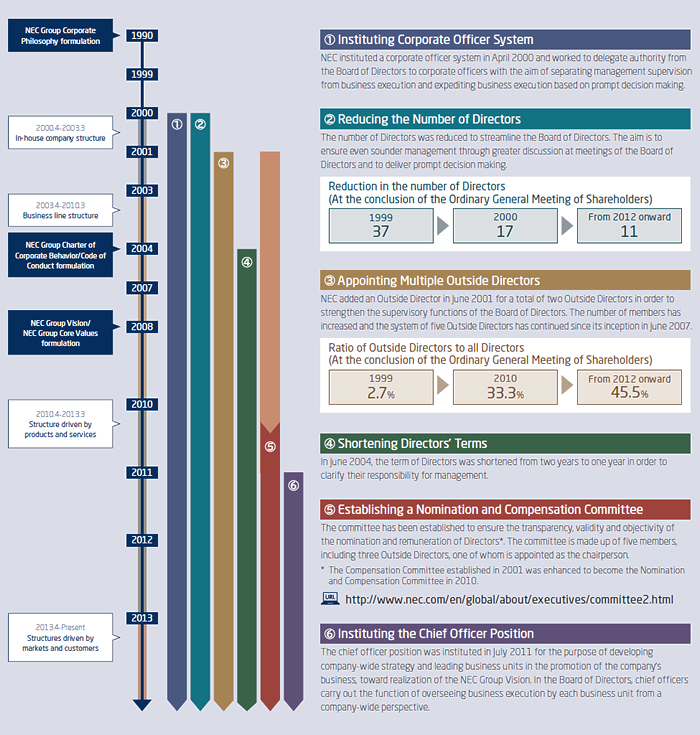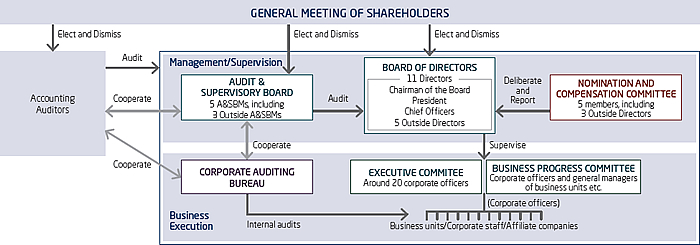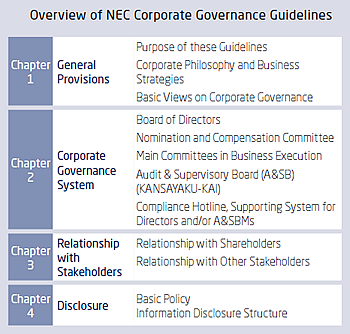In recognition of the fact that reliable corporate governance is essential to the continuous creation of social value and the maximization of corporate value, NEC is committed to strengthening its corporate governance practices through (1) assurance of transparent and sound management, (2) realization of prompt decision making and business execution, (3) clarification of accountability and (4) timely, appropriate and fair disclosure of information.
- Main Initiatives for Strengthening Corporate Governance
- Overview of the Corporate Governance Structure
- Continued Strengthening and Improvement of the System
Main Initiatives for Strengthening Corporate Governance

Overview of the Corporate Governance Structure

Board of Directors
The Board of Directors holds regular meetings once a month in principle and extraordinary meetings as necessary to determine important matters related to business execution, including business realignment, funding plans and financing and investment, as well as matters concerning business plans.
Fiscal 2016 Status
In addition to receiving Chief Officers' activity reports and management plans and progress reports for each business segment, the Board of Directors actively discussed initiatives for the strengthening of corporate governance, reform of underperforming businesses and the Business Process Optimization Project, etc. A broad range of advice was given by Outside Directors, in particular, tapping into their own extensive experience in such roles as corporate management, and based on their deep insights.
Executive Committee
The Executive Committee discusses important NEC Group management issues such as policies and strategies. This committee extensively discusses matters of particular importance prior to putting them forward to the meetings of the Board of Directors for approval. In doing so, the committee enhances the deliberations and ensures appropriate decision making.
Business Progress Committee
The Business Progress Committee deliberates and reports on matters related to the status of the NEC Group' s business execution, such as monitoring progress with respect to meeting budgets approved by the Board of Directors, with the aim of sharing management information and promoting execution efficiency.
Nomination and Compensation Committee
The Nomination and Compensation Committee deliberates on (i) nomination of Directors, Representative Directors and Audit & Supervisory Board Members (KANSAYAKU) (“A&SBMs”), the chairman of the Board, and the president and (ii) the structure and the level of remuneration for Directors, representative Directors and corporate officers from an objective perspective. The committee reports the results of its deliberations to the Board of Directors.
Audit & Supervisory Board (KANSAYAKU-KAI) (“A&SB”)
The A&SB holds regular meetings once a month and extraordinary meetings as necessary, decides on audit policies, standards, and annual audit plans, etc. and receives status reports on audits from each Audit & Supervisory Board Member (KANSAYAKU) (“A&SBM”).

- Director bonuses are linked to the NEC Group' s performance to assure performance incentives. Bonuses are not paid to Outside Directors in order to help ensure their independence.
- NEC does not disclose remuneration per individual. For NEC' s basic remuneration policies and systems, please refer to the Business Report in the notice of the 178th Ordinary General Meeting of Shareholders and Corporate Governance Report.
- The above headcount includes 1 A&SBM who retired at the close of the 177th Ordinary General Meeting of Shareholders held on June 22, 2015.
Continued Strengthening and Improvement of the System
NEC adopts the Company with Audit & Supervisory Board Members (KANSAYAKU) corporate structure to provide a double-check process: the Board of Directors supervises business execution and the A&SB audits the legitimacy and appropriateness of NEC' s decision making or activities. We have established a hybrid structure by utilizing the combination of a corporate officer system, multiple Outside Directors, and the Nomination and Compensation Committee, which we established voluntarily and is comprised of a majority of Outside Directors. In this way, we separate management supervision from business execution while striving to ensure management transparency and soundness.
NEC believes that its corporate governance is functioning adequately under the current system described above. However, NEC realizes the importance of further strengthening its corporate governance in order to focus on “Solutions for Society” and to strive to create social value and maximize corporate value.
NEC has mainly carried out the following initiatives in light of Japan' s Corporate Governance Code that took effect from June 2015.
Early Disclosure of the Notice of Shareholders' Meeting
NEC posted the notice of the 178th Ordinary General Meeting of Shareholders held on June 22, 2016 on its website prior to the date of sending it out (May 31, 2016).
Revision of Criteria for Matters to Be Discussed by the Board of Directors
In the interest of strengthening the Board of Directors' supervision functions and speeding up business execution, we have revised the criteria for matters to be discussed by the Board of Directors in order to expand the authority delegated to corporate officers from the Board of Directors with respect to business execution.
Evaluation on the Effectiveness of the Board of Directors
In order to improve the functions of the Board of Directors, NEC has conducted an analysis and evaluation on the effectiveness of the Board of Directors. In fiscal 2016, each Director and A&SBM answered a questionnaire and was interviewed about the role, composition and operation of the Board of Directors, and the Board of Directors discussed its effectiveness based on the results of such questionnaires and interviews. As a result of the discussion above, it has been evaluated that in terms of decision making for NEC' s important business execution, business strategies and business plans, the Board of Directors is structured and operated to facilitate active discussions, and the Board of Directors has been functioning appropriately as a whole.
Meanwhile, it has been confirmed that the Board of Directors needs to narrow down the matters and clarify the key points to be discussed at the Board of Directors, in order to further enhance deliberations at the Board of Directors and to more appropriately indicate the strategic business direction of NEC. Based on the results of the analysis and evaluation on the effectiveness of the Board of Directors, NEC will continually make the deliberations at the Board of Directors more active.
Further, in June 2016, NEC adopted the NEC Corporate Governance Guidelines, which set out the basic framework and policy of NEC' s corporate governance system to help strengthen the relationship with stakeholders, thereby contributing to sustainable growth and the increase in corporate value.
In addition to our basic views and policy on corporate governance disclosed in our Annual Securities Report and Corporate Governance Report, we disclose our policy on (i) active deliberations at the Board of Directors, (ii) oversight by the Nomination and Compensation Committee of succession planning for the President, (iii) appropriate measures to ensure the exercise of shareholder' s voting rights at the General Meetings of Shareholders, (iv) supporting system for Directors and/or A&SBMs and (v) challenges surrounding sustainability in these Guidelines, which systematically show the status of NEC' s corporate governance.

*Please see the following URL for details on the contents of these Guidelines.
http://jpn.nec.com/profile/en/pdf/nec_governance_20160601.pdf
Going forward, we aim to achieve more effective corporate governance, which we will continually strive to strengthen and improve.
*For further details on the corporate governance of NEC Corporation, please visit the following URL:
http://jpn.nec.com/profile/en/governance.html